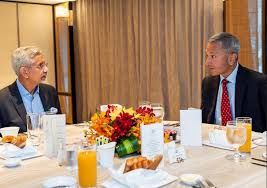India’s role key in multipolar world, says Singapore minister after meeting EAM Jaishankar

In a strong endorsement of India’s rising geopolitical stature, Singapore’s Foreign Minister, Vivian Balakrishnan, emphasized that India is poised to be a “major tent pole” in the evolving multipolar global order. His comments came following a high-level meeting with India’s External Affairs Minister, Dr. S. Jaishankar, in Singapore on July 13, 2025. The meeting reflected the growing synergy between the two nations on regional security, economic cooperation, and strategic connectivity.
🌏 India’s Growing Influence in a Multipolar World
As the unipolar dominance of the post-Cold War era continues to fade, the world is steadily transitioning into a multipolar framework. In this new global landscape, regional powers are gaining importance for their ability to shape regional and global narratives. According to Minister Balakrishnan, India is “increasingly becoming one of the major poles of opportunity” in this multipolar reality.
His remarks acknowledge India’s economic resilience, demographic strength, diplomatic outreach, and strategic importance in the Indo-Pacific region. Balakrishnan highlighted how India’s size, potential, and democratic values give it an edge in shaping the future of global governance and trade.
🤝 Strengthening Bilateral Ties: Singapore and India
The meeting between Jaishankar and Balakrishnan was not merely symbolic; it had significant diplomatic weight. Both ministers reviewed the current trajectory of India–Singapore relations and explored new avenues of cooperation, particularly in trade, digital innovation, semiconductor technology, and skills development.
Singapore has long been a strategic partner in India’s “Act East Policy” and a vital node in New Delhi’s Indo-Pacific outreach. The two countries already share a Comprehensive Strategic Partnership (CSP), which was elevated in 2015. This latest dialogue reinforces the importance both sides place on sustaining momentum in this relationship.
During their discussions, the ministers also agreed to hold the third India–Singapore Ministerial Roundtable in New Delhi soon. This platform is expected to focus on deepening collaboration in sectors like fintech, logistics, clean energy, and education.
📈 Economic and Strategic Significance
Singapore is India’s largest trade partner within ASEAN and a key source of foreign direct investment. The city-state serves as a gateway for India’s economic engagement with Southeast Asia and beyond. It is also one of the earliest adopters of India’s Unified Payments Interface (UPI), underscoring strong digital financial cooperation.
From a strategic standpoint, Singapore’s location in the heart of the Indo-Pacific makes it a crucial partner for ensuring free and open sea lanes—an issue that aligns closely with India’s security priorities. Both countries regularly conduct bilateral naval exercises, and Singapore remains an essential dialogue partner in ASEAN-led forums.
💬 India’s Global Agenda and Regional Diplomacy
Minister Jaishankar’s visit to Singapore comes at a time when India is stepping up its global diplomatic engagement. His tour is part of a broader strategy leading up to the Shanghai Cooperation Organisation (SCO) Foreign Ministers’ Meeting, where India aims to present itself as a stable and constructive player in Asia and beyond.
Jaishankar has also been a vocal advocate of reforming multilateral institutions, ensuring fairer global economic practices, and promoting South-South cooperation. These goals are increasingly resonating in a world that seeks more inclusive governance structures—another reason why India’s influence is growing in a multipolar setting.
🛡️ Shared Values in an Uncertain World
Amid rising geopolitical tensions, including the U.S.–China rivalry, Russia–West divisions, and economic disruptions, the Singapore–India relationship stands out as one built on mutual respect and pragmatic cooperation. Minister Balakrishnan noted that countries like Singapore, while small in size, thrive by building strong and deep relationships with multiple powers—including India, China, the U.S., and the EU.
In that context, India’s consistency in advocating peaceful dialogue, development-led diplomacy, and respect for sovereignty aligns well with Singapore’s own foreign policy principles. Both countries believe in multilateralism, open markets, and regional stability—making them natural allies in an unpredictable global environment.
🔮 Looking Ahead: Opportunities and Challenges
As India positions itself as a driver of global growth and stability, partnerships like the one with Singapore will play a key role. Areas like clean energy collaboration, AI research, cybersecurity, digital trade, and smart urban infrastructure offer promising avenues for future growth.
However, both sides will also need to navigate challenges like global supply chain disruptions, regional flashpoints in the South China Sea, and shifts in U.S.–China relations. Cooperation on climate goals and human capital development will also be vital in adapting to changing global priorities.
📌 Conclusion
The recent remarks by Singapore’s Foreign Minister reinforce a growing global consensus: India is not just a rising power—it is an indispensable one. As the world shifts toward a more decentralized power structure, India’s balanced approach to diplomacy, coupled with its economic and demographic heft, makes it a key player in the new world order.
The strategic warmth between India and Singapore highlights the importance of trust-based partnerships in this era of uncertainty. As both nations look ahead, their collaboration could serve as a model for small and large nations working together for mutual growth, peace, and stability.






